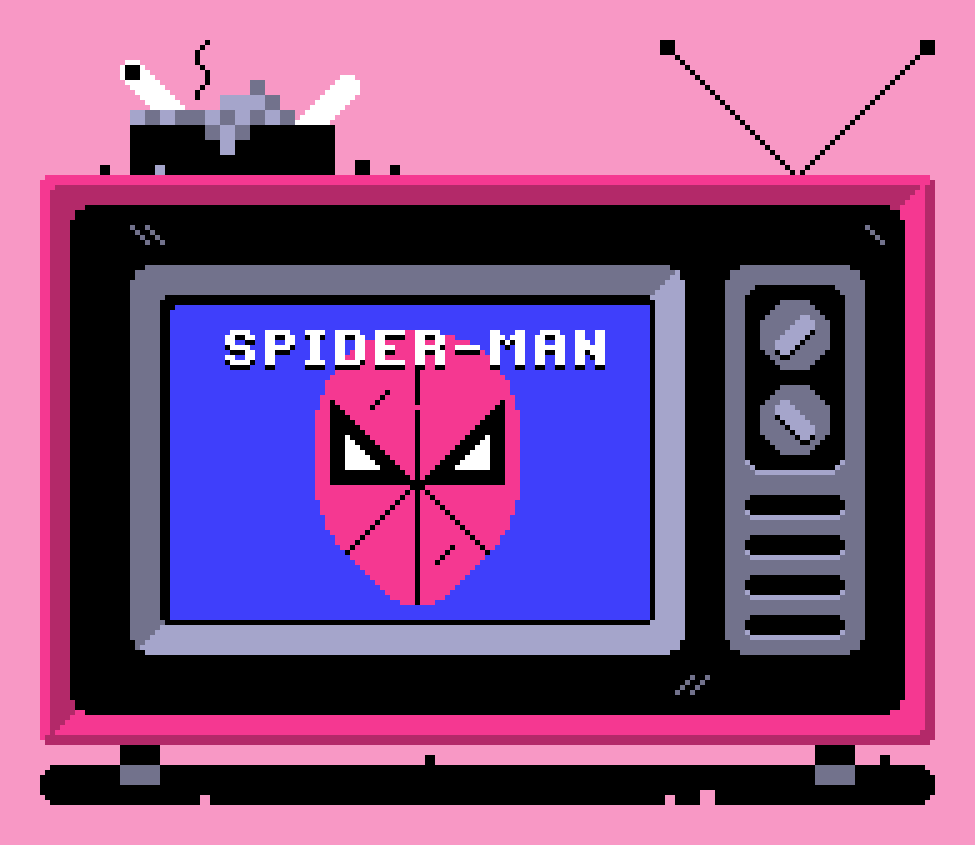I came late to television. I was five when my neighbor in Santo Domingo bought the first set on our street, the first I’d ever laid eyes on. I can still see it in my mind’s eye: a small color TV with long insectoid antennae; an alien device to a kid who had spent most of his childhood with no running water, who considered watching goats climb onto cars and houses serious entertainment.
Maybe I would have been O.K. if I’d seen anything else: the news, a variety show, a political debate. But my earliest exposure to television was a Spider-Man cartoon—one of the flipped-out Ralph Bakshi episodes from the late sixties. In other words, the first thing I saw on TV was America.
A little context: I had a father in New York City whom I did not remember, and who (it was promised) would one day deliver my family to the States. And here was my first television and my first cartoon and my first superhero—a hero who, like my father, was in America—and somehow it all came together for me in a lightning bolt of longing and imagination. My father’s absence made perfect sense. He couldn’t come back right away because he was busy fighting crime in N.Y.C. . . . as Spider-Man.
The diasporic imagination really is its own superpower.
I became convinced that I was the son of Spider-Man. Like, seriously. You couldn’t tell me otherwise. I went apeshit for climbing trees; sometimes I ran head first into our zinc fence, like the Rhino. (I had no problem playing both hero and villain.) My mother was too busy working to make much of it, but my abuela, who watched my brother and me, was, like, “Algo se le montó.”
It all ended exactly as you might expect: one overcast day, I plummeted out of our avocado tree with an unheroic shriek and landed belly down on the barbed wire separating our house from our neighbor’s.
My mother stitched me up herself and promised to knock me out of the next tree she found me in. She didn’t have to worry; the hole I’d sliced into my abdomen put an end to my Spider-Man reënactments. I stopped climbing, stayed resolutely terrestrial. But TV—that was something else altogether.
No sooner was I allowed out of bed than I was hobbling back to my neighbor’s set. That eerie little box had a power that not even evisceration could discourage. Near-gutting or not, I believed I had seen my father on that TV, and if I paid close enough attention it would show him to me again. TV was my scryer’s ball, my very own palantír, and, Denethor-like, I consulted it feverishly, searching for signs of my long-lost dad and the new world to come.
For the record: my father did eventually return and take us to the States. Not to New York City, as expected, but to central New Jersey. Goes without saying that none of it looked like the Spider-Man cartoon, not even the landfill.
Those first years, we had a pretty rough time of it. It’s hard to describe the initial shock, the terrible bewilderment, the agonies. No way to talk about it then; barely any way to talk about it now. I had no idea how I was supposed to act or dress or walk or be. I didn’t understand what anyone was saying, or why the other black folks in our neighborhood didn’t speak Spanish.
My father was the worst shock of all. He had no problem laying hands on us kids for the slightest infraction. Beatings like he was making up for lost time. Like he was mad he had a family. Before our first month was out, he had introduced my brother and me to his side chick as though it were the most normal thing in the world. It turns out the old man did have a secret life in America, but it had nothing to do with fighting crime. No, he was not the hero I had dreamed of, and no amount of wishing could make it so.
Are you surprised, then, that I was drawn back to the television? Haunting it as much as it haunted me. Flipping through the channels restlessly. From VHF to UHF, and back. Late into the night, when everyone else was asleep and almost no channels were on. Because I was lost, because I wanted help with my English, because my father was a nightmare. And because I was convinced, foolish little fantasist that I was, that somehow my family and I had ended up in the wrong America and that the country and the father I’d first glimpsed on TV in Santo Domingo, the country and the father I’d been promised, were still out there somewhere.
I just had to find them.
Never did. ♦
